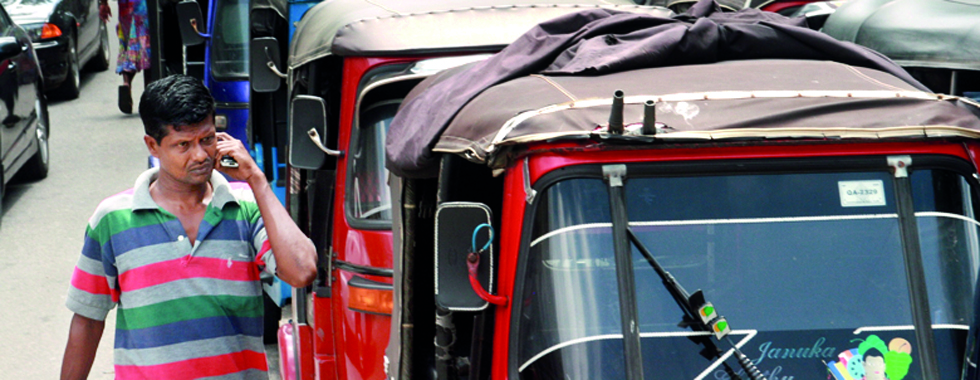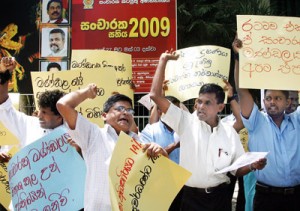“Please remove our fear, Mr. President,” pleads SL’s top global rights campaigner
View(s):Radhika Coomaraswamy, Sri Lanka’s globally acclaimed human rights advocate, on Wednesday had a simple message for either of the country’s two main combatants at the January 8 presidential elections:
“… what I would like perhaps on January 9th –whoever is elected president –, is … that, ‘Mr. President … Please remove my fear’.”
This in essence was the crux of her argument for crucial reforms to the Sri Lankan framework for change during a presentation on “Priorities for the President: Civil society perspectives” organised by the International Centre for Ethnic Studies (ICES) on Wednesday at the ICES auditorium.
The panel discussion, in which Udan Fernando, Senior Research Professional at the Centre for Poverty Analysis (CEPA) and senior journalist Feizal Samath also made contributions on civil society initiatives and private sector expectations, is the first such dialogue by civil society on the presidential poll.

Three-wheeler protest.
Dr. Coomaraswamy, an Emeritus Fellow at ICES, the first UN Special Rapporteur on Violence Against Women and who subsequently served as the UN Under-Secretary General and the Special Representative of the UN Secretary-General on Children and Armed Conflict, lambasted the statement by Minister S.B. Dissanayake on former President Chandrika Kumaratunga (on ‘removing her clothes in public’). “That was so outrageous that we don’t have to go beyond that to say (know) about our public culture (and its decay),” she said in a powerful analysis of the current systems and structures.
Dealing at length with the constitution and other developments in political history, she said that reforming politics, political institutions and rule of law institutions is now absolutely crucial along with the change in the political culture. “Without that we are doomed and the economy is doomed,” she noted.
She said the decay in the political institutions began long time ago with the 1970 and 1972 constitutions beginning the process of politicisation.
The 1970 and 1977 era had the use of thuggery and both contributed to the decline in the ‘rule of law’ institutions, but today “we have reached a real peak in the decay of our political and legal institutions”, she noted.
Constitutional Commission
She urged the next president to immediately set up a constitutional commission like in South Africa with noted jurist Professor C.G. Weeramantry whose integrity cannot be questioned, as chairperson.
She said such a commission should consult all groups, consider diverse views and present a consensus document where everyone in the country has an opportunity (to live in peace, equality and with dignity).
“What we lack in Sri Lanka is a constitution that is truly a social contract. We have had constitutions usually imposed by political parties in power, 1972 by SLPF and 1977 by the UNP. It is time we have something that is not either imposed on by the colonial masters of politicians but where we go through a process of national constitution and come up with a national constitution,” Dr. Coomaraswamy said, adding that in this context the following needs to be addressed:

Three-wheeler protest.
“On the issue of whether to abolish or modify the executive presidency, I think after what we have experienced with the presidency of the last 20 years, all of us here (at the ICES discussion) would want parliament to be supreme. But there are some areas where I think we have to worry about (and where there is a need for some elements of the presidency). Maybe we can structure something which has the supremacy of the parliament but where the presidency also has a role.”
“Secondly, we need a strong moral parliament, not just a talking shop. Select committees are used today to harass people, whether its NGOs or chief justices. What we really need are broad-based theories and to gather evidence to create effective legislations.”
Strong judiciary
She said it was absolutely important to have a strong judiciary. “While judicial power in the present constitution is exercised by parliament through the courts, we need a system where judicial power is exercised by the courts and not through the parliament. This was done in 1970s etc because they were afraid that time of western interests especially public interests preventing rapid development. I don’t think we are in a situation like that now. We can have a strong independent judiciary. The lack of a strong independent judiciary is the reason why we have no real strong human rights litigation in this country.”
She urged the formation of a credible truth and reconciliation process acceptable to all parties that leads to justice which is the only way to meet the country’s international obligations.
Another matter of concern, Dr. Coomaraswamy noted, is Israeli-type tactics being used in Jaffna. “One of the most disturbing developments is that the present army commander of the Jaffna peninsula was posted there after two years of training in Israel. Having visited Jaffna often in the past two years and also having visited the West Bank, Jaffna is looking a lot like the West Bank. Every other person is said to be an informer, everybody suspects everybody of being an informer … this is an Israeli practice. The army visits all the NGOs and anyone they feel like. This is just what Israelis do in the West Bank. If anyone wants to know how disastrous this policy is, see what happened in Gaza,” she noted.
She had a word of advise for the Tamil National Alliance saying the latter has equally created a culture of violence and impunity and urged the party to reach out to the Sinhalese.
“… my New Year wish is that the TNA visit the Mahanayakes’ and after that Sinhalese civil society groups and community groups. I think it’s time they reach out to the Sinhalese societies,” she implored.
On the role of the military in the post-war scenario, the former UN diplomat spoke on the need for the SSR which in UN language means Security Sector Reforms.
“To me this is the most important thing for any future president. I have visited Pakistan, Egypt, Indonesia and Philippines where empowered armies are a disaster for democracy, social inclusion and participation. The army involved in economic activities in those countries makes them have vested interests in political and economic policies. With regard to civilian work, the army doesn’t like it. I spoke to some at the Victoria (Vihara Maha Devi) Park and they don’t enjoy it at all,” she said justifying the need for SSR.
Demobilise army
She called for a strong demobilisation programme for army personnel saying there are examples of all over the world where they have had training and education and gone into civilian life as graduates and entrepreneurs. The Kotelawala Defence Academy can be the centre for the SDR process, she added.
Dr. Coomaraswamy believes there is no need for a strong army to deal with a perceived LTTE threat since the violent period is over.
“What is happening though is that the diaspora and LTTE hardliners are now trying to force a Scottish-style referendum on Sri Lanka. Thus the LTTE attack is not military but political and (in such a case) you cannot meet that situation with a military response. That is counterproductive. You have to win the hearts and the minds of the people in the North in such a situation. Remember that a referendum is something that the international community is likely to support. I think we really have to take stock of what is going on in the North and the East,” she added.
| Civil society weak in SL Sri Lanka’s NGO-led civil society is essentially weak, financially and for other reasons, noted Udan Fernando, an NGO activist and research analyst. Speaking at the ICES session on civil society perspectives on the January 8 presidential poll, he said that the NGO-led civil society is weak due to a variety of reasons including donor fatigue as well as stringent control, intimidation and surveillance by the government. This grouping has also suffered legitimacy-erosion as a result of a sustained anti-NGO lobby under the patronage of the government and some constituent parties of the alliance that tow a strong anti-NGO line. He said the main impulses of the majority of civil society groups are anger, frustration and outrage against the MR (Rajapaksa) regime, which has been responsible for the subversion of the rule of law, prevalence of mass scale corruption, impunity, suppression of dissent and nepotism. “There is a sense of desperation among civil society groups to make the change happen. This is partly manifested in accepting anybody who crosses over from the pro-government camp,” he said citing the example of film director Somarathne Balasuriya, described as a crony of the government, who joined an artistes’ group that is backing the common opposition candidate. “While this is an opportune moment for civil society groups to work hard towards a regime change, it should be borne in mind that a lack of a clear perspective and strategy regarding post-January 8th situation could send civil society groups on the same trajectory of disillusionment that was experienced in the 1994 era. Civil society, to my understanding, functions best when they are in a mode of opposition rather than collaboration,” he said adding that “engaging while maintaining a certain degree of independence is however a challenging act”. Integrity is the challenge for SL’s private sector Integrity is the challenge for Sri Lanka’s private sector in the next few years in helping to craft a society of values, discipline and understanding, said veteran journalist and business writer Feizal Samath. Speaking on the expectations of the private sector from the two main candidates at the presidential poll, he started off his comments at the ICES discussion saying ‘integrity’ – as defined by popular TV talk show host Oprah Winfrey – is the challenge of a sustainable corporate sector. He spoke on the benefits that accrued to the corporate sector after the war ended in May 2009 and, on the flip side, the concerns that arose after that. Benefits, he said, included peace and stability; growth in tourism; global brands coming in; the stock-market taking off amidst some ‘unruly’ happenings; growth in small businesses and the retail sector; growth in infrastructure and people eating out (takeaways) more regularly as evidence of a growth in incomes. The concerns and worries, he noted, have been that the country’s debt situation is rising; loans and borrowings from foreign and local banks are increasing: income growth resulting in sections of the middle class living off a credit card and chasing goods with no money in their hands; dispute over inflation and GDP growth figures which doesn’t reflect real prices; corruption and businesses in desperation paying out of fear that they would get crowded out; erosion in the rule of law; justification of crony capitalism as explained by a minister who said that they (ruling party higher-ups) have made enough money that people now “have to only worry about UNPers making money”; and inconsistent policies. However, he also noted that it is too late to turn the clock back on free-market economic reforms as globalisation and the WWW (worldwide web) are now firmly ingrained in societies across the world. |


